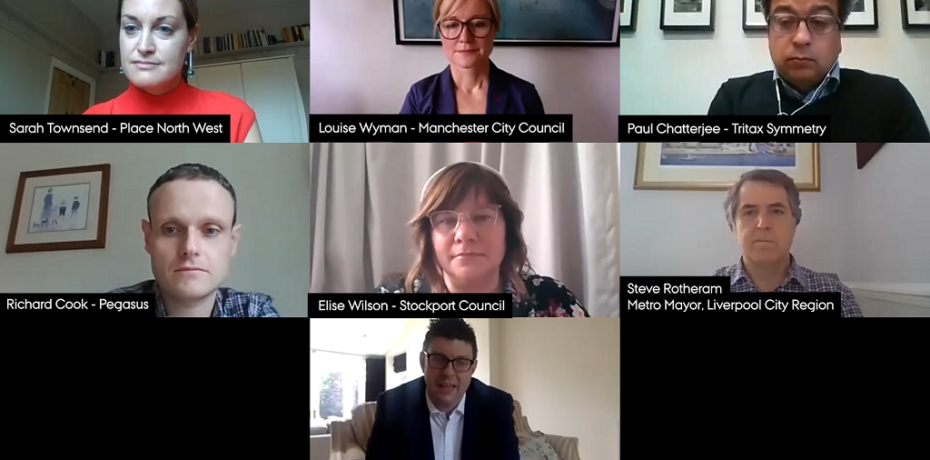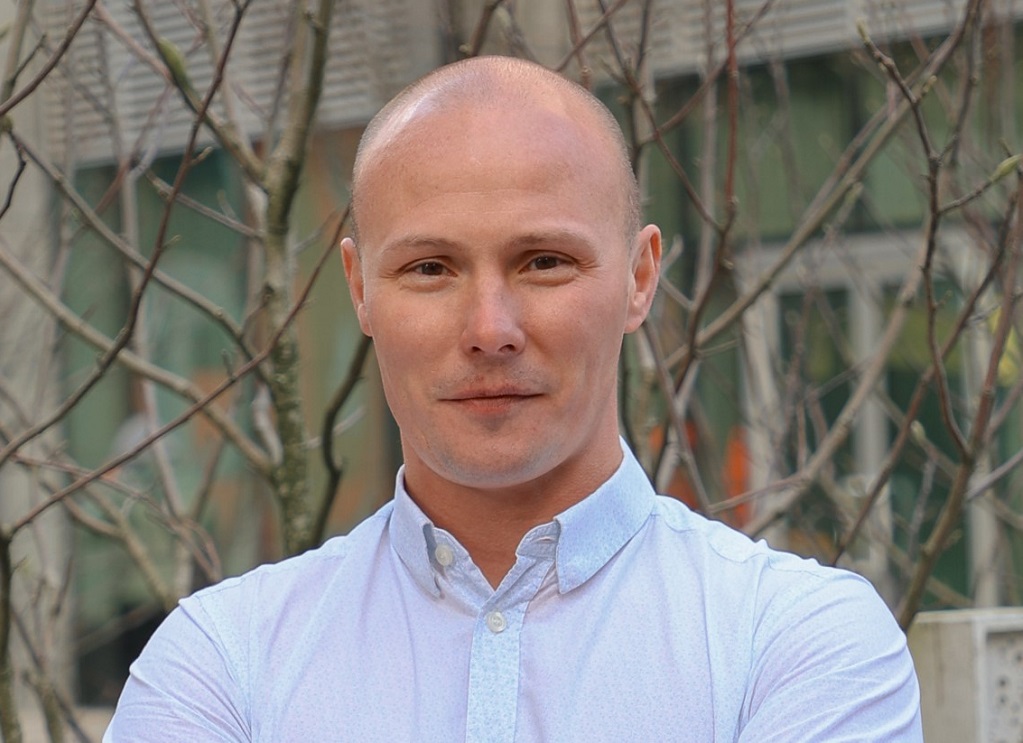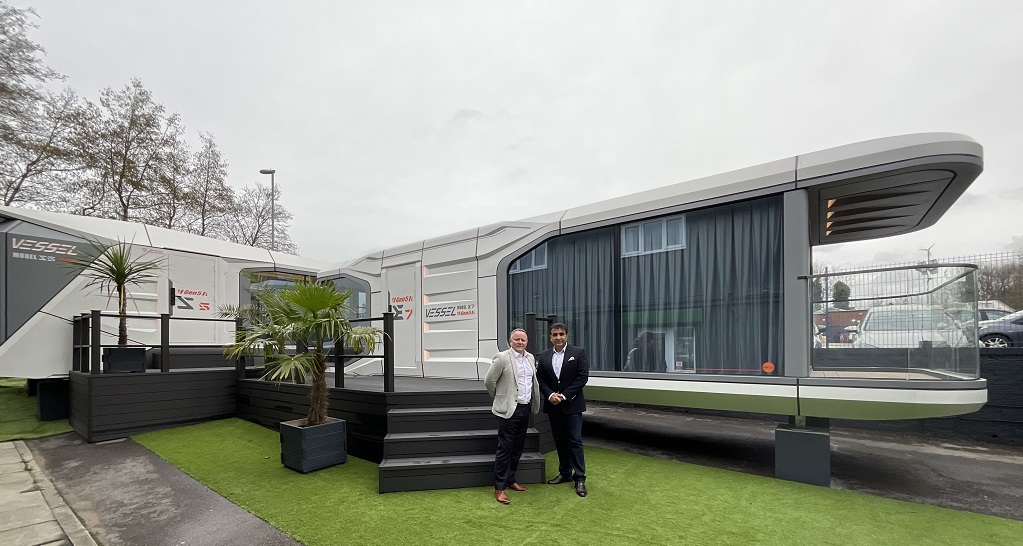Event Summary
Northern Powerhouse: Levelling Up | Video + summary

At Place North West’s latest event, key figures from local and regional government, and other experts, discussed what the concept means in 2020 and whether the Prime Minister’s ‘levelling up’ agenda can be achieved to drive the region’s growth post-Covid-19.
The event on Tuesday 14 July was sponsored by strategic consultancy Lexington Communications, and attracted over 300 live viewers.
Place North West editor Sarah Townsend hosted the discussion with a panel of professionals representing a range of disciplines across the property and economic development sectors:
- Louise Wyman, Manchester City Council strategic director of growth and development
- Steve Rotheram, Metro Mayor of the Liverpool City Region Combined Authority
- Henri Murison, director of Northern Powerhouse Partnership
- Richard Cook, economics director at advisory firm Pegasus
- Paul Chatterjee, development director of industrial developer Tritax Symmetry
- Cllr Elise Wilson, leader of Stockport Council and economic lead of the Greater Manchester Combined Authority
Key questions:
- How much progress has been made since ex-Chancellor George Osborne set out the ‘Northern Powerhouse’ concept in 2014?
- What more needs to be done, both politically and financially, to ensure greater autonomy for the North?
- What are the hurdles and stumbling blocks that must be overcome to bring about real change?
Main takeaways:
- Northern local authorities need far more devolved economic and political devolution to truly lead the economic fortunes of their localities
- Boris Johnson has four years to make good on pre-election promises or else face questions on his commitment to levelling up the North
- Investment in places must be matched by investment in job creation to ensure that people and companies have a base from which to grow and do not move elsewhere
- West-to-east transport connectivity is more important to Liverpool and other North West cities than linking the North to the South, to drive economic prosperity
Henri Murison said that, since 2014, Government support for the Northern Powerhouse had “waxed and waned” and Whitehall had yet to deliver on the promises it made around devolution.
“We need to see Government following through on its commitments,” he said. “The North of England has never given up on the Northern Powerhouse and actually the agenda [shouldn’t] belong to Government anymore, but to metro mayors, business leaders and civic leaders,” he said.
Collaboration is key to keep momentum going, he added, while urging Government to give Northern authorities the tools they need to tackle problems in their localities.
Murison said that more investment is needed in research and development to attract businesses and keep them in the North.
“We need to capture fast-growing sectors and give them places to base themselves in, otherwise we are doing the world’s R&D investment for them.”
He added: “Greater Manchester has capacity to borrow up to £750m [from debt markets, public and private funds and other sources], which it could do if it was given the freedom and permission from Government. Across the North, the total borrowing capacity is £5bn.
Steve Rotheram said the Northern Powerhouse needed “true power” but this has yet to happen.
Rotheram said the powers granted to councils so far were “delegated rather than devolved”.
Despite constraints, the Liverpool City Region is the fastest growing combined authority in the country, he claimed.
He also encouraged other areas, such as Cheshire and Warrington, to look at forming combined authorities.
“I’d rather decisions be made locally rather than the Whitehall mandarins deciding what is in our best interest,” he said.
Post-Brexit, Liverpool could play a key role in importing goods from the US should new trade deals be struck, thanks to the city’s western-facing port, Rotheram added.
However, for this to be effective, better east-to-west rail connectivity is needed. “If the Government doesn’t build better connectivity, the freight that comes in would have to go on the road and that’s no good for a million reasons.”
Elise Wilson said the Northern Powerhouse agenda should be seen as a way to deliver regeneration and transformational change but that, at present, the concept feels “wishy-washy”.
“To not have [the Northern Powerhouse] perceived [by Whitehall] as a priority strategy for helping the UK as a whole is madness. It isn’t just for the benefit of the North, but for the whole [country’s] economy,” she said.
To create better links between Northern cities and towns, and create sustainable places, regional councils must “stress the distinctiveness” of different areas and “remain ambitious”, she said. “It is about having a serious conversation about how we want to live,” she said.
Wilson described the delayed Greater Manchester Spatial Framework – a plan mapping out how land in across the area’s nine districts should be allocated – as a “significant tool to deliver on ambition and strategy”.
“It’s not just about homes, it’s a holistic package that is looking to grow the economy,” she said.
Richard Cook said: “I’m a big supporter of devolution and far more needs to be done, and far more control needs to be given to the metro mayors.”
If the North does not receive a fair share of the £900m pot of funding the Government has set aside to support “shovel-ready” schemes across the country, Prime Minister Boris Johnson will have a lot of questions to answer, Cook said.
“He got elected [in many areas] on his pledge to level up the North, and won because people believed what he said. For the next four years he has got to start delivering on what he promised.”
Cook also said the GMSF needs to be revisited to address an imbalance between job provision and homes. “The GMSF needs to identify how it is going to level up the North not only in terms of delivering homes faster, but also in terms of linking homes and job numbers.
“There’s a lot of talk about with regard jobs, but where are all these people going to live?”
Louise Wyman said the Northern Powerhouse was about “coalition” working. “Cities, towns and rural areas can thrive if we all work together,” she said.
One of the projects put forward in response to the Government’s call for shovel-ready schemes is the “transformational” £1bn Mayfield development, which she described as “Manchester’s King’s Cross or York Central”.
Wyman said Northern cities can attract overseas investment by showcasing their “brands”, and added that it is important not to rely too heavily on Whitehall for support.
“Manchester is famous for being bold and ambitious and finding partners,” she said. “We’ll be going after overseas investment, as well as funding from Whitehall. We need to operate on a number of fronts.”
Paul Chatterjee said it was “disappointing” to see Tritax Symmetry’s 1.5m sq ft Symmetry Park, a proposed industrial park in Wigan, called in by the Secretary of State in recent weeks, especially as the site has already been identified for employment uses.
Logistics has become a “key economic driver”, and the last six months has seen the best-ever half-year take-up in industrial space on record, he said.
“Failure to release the land and get planning quickly means we are going to be behind the curve,” he said.
Chatterjee added that, increasingly, developers are working to maximise the social impact of projects, and said that this method of measuring the future success of Northern Powerhouse initiatives will become increasingly important, particularly post-pandemic, when the public is more and more concerned with healthy, sustainable places to live and work.
“The development community is working towards a greener, more socioeconomically beneficial, offer. All of this is going to create health benefits, allowing people to work longer, and improving projects’ [gross value add],” he said.




